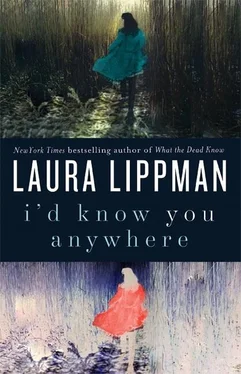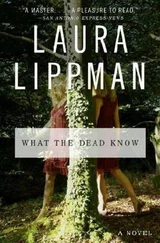But that evening, as Eliza tried to fall asleep in a strange bed, away from Peter, Iso, and Albie, she found herself reviewing the day’s events. Of all the funny stories she and Vonnie had shared, almost every one came from before . Was that because Vonnie had left for school? Or because the Lerner family lost its ability to be silly after Eliza came home? Strange, but she had never considered until now the totality of what Walter had taken, from all of them. From the day she came home, the Lerners had lived with a sense of remission, grateful yet skittish. They were well today, but that could end tomorrow. Of course that was true of every happy family. The difference was that the Lerners knew . Having been unlucky once, they could be unlucky again. There was no protection, no quota system when it came to luck. It was like that moment in math when a child learns that the odds of heads or tails is always one-in-two, no matter how many times one has flipped the coin and gotten heads. Every flip, the odds are the same. Every day, you could be unlucky all over again.
“BACK AGAIN, MISS LAFORTUNY?”asked the young woman at the Hampton Inn’s front desk.
“You know me. I like to check on my boys.”
The clerk, a sweet-faced girl who should have taken better care of herself—everything about her appearance screamed poor nutrition and lack of exercise—smiled noncommittally. Like most people that Barbara met, she seemed torn between admiring her advocacy work and being horrified by it, with horror having a slight edge.
“How many you got now?”
“Just three, and they never let me see the one on death row. But I have the two others, and I am allowed to visit them from time to time. If they’re good. And I’m good.”
“I’m sure you’re always good, Miss Barbara,” the girl said. Not even two hundred miles from Baltimore and yet the manners were markedly different here.
“Oh, you’d be surprised. I can be a rabble-rouser.”
“I bet you can,” the girl said agreeably, going through those mysterious computer clicks that seem required of every transaction these days. Barbara wondered if teaching, too, now required moving through computer screens. Grading was probably done electronically, come to think of it. In her day, she had pressed hard, in ink, so her judgment would pass through multiple sheaves of paper. Cs. She had mainly given Cs, which had been slightly better than most of her students deserved. She’d never make it in today’s more lenient environment.
Barbara had started writing her two “boys” at Sussex after she began her relationship with Walter. She had sought them out specifically for their location, keen to have a reason to drive down here, although she realized that she would never be given visiting privileges with Walter. Still, it made her feel closer to him, just passing through the gates of Sussex. And the two men she had chosen did need her. Both were African-American, and there was no doubt in her mind that their sentences were harsher because of that. Bobby Ray, the one she would visit tomorrow, had been a drug addict who ended up killing two women in a robbery attempt that could only be described as pathetic. The women were addicts, too, and also African-American. If they had been white, he almost certainly would be on death row with Walter. But that was small consolation to Bobby Ray, who yearned to take his sober self into the world, to find out what it might have been like to live clear-headed. He didn’t go so far as to say it was unfair for his sober self to be locked up for what his drugged-up alter ego had done, but Barbara could tell it pulled at him. She believed he deserved a second chance, but she also had a hunch he would blow it, should that day ever come. Sobriety may have been forced on him in prison, but responsibility had not, not in any real way. Bobby Ray was not equipped for the real world, not that she would tell the parole board that, if the day ever came. She would file a brief in his favor and do everything she could to help him succeed.
She unpacked her small bag, although she would be in the room no more than fourteen hours, checking out on her way to the prison. She wondered if Eliza Benedict was in this very motel, or if she had opted to drive down tomorrow. Perhaps she would see her at the breakfast buffet in the morning. She called the front desk, asked to be connected to Eliza Benedict’s room. “No one by that name has checked in, Miss Barbara,” the desk clerk said. Lerner, then? “No, ma’am, and no one with a reservation under either name.”
All for the best. Barbara’s presence would unnerve Eliza, perhaps even make her suspicious. She probably shouldn’t have come down at all, but her trip was legitimate, and Bobby Ray looked forward to their visits. Why should he suffer? Besides, it was good karma, for Walter. She was putting her energy into the air, trying to create an aura.
She removed the bedspread—a friend who had attempted to organize Baltimore motel maids into a union had told her that motel bedspreads crawled with bacteria—and lay on the sheets, flipping through the channels to CNN, watching the crawl across the bottom of the screen. On Tuesday, one way or another, Walter’s name would be there. Actually, his name probably wouldn’t be used. He would be reduced to DEATH ROW INMATE or VIRGINIA SERIAL KILLER. The latter bothered her for several reasons. It wasn’t correct, for one thing. Was two even a serial? By temperament, Walter was more of a spree killer; the odious Jared Garrett had that much right. Based on what Walter had told her, she believed he had a psychological defect that had been triggered by something the two girls had said or done. A woman in Texas had claimed she went temporarily insane when her lover’s wife shushed her, and next thing she knew, the woman was lying on the floor of her garage, hacked to death by her own ax. That woman had been acquitted. But Barbara had never tried to draw Walter out on the killings. Such a discussion seemed prurient, distasteful to her. Besides, that Walter no longer existed. Like Bobby Ray, he was a different man in prison than he had been before.
Unlike Bobby Ray, he had no chance of testing that new persona in the world at large, yet he would probably be more successful. Walter had skills. Walter had really thought about what he had done.
But it was Barbara who, in her letters, had pointed out to him the glaring inconsistency of Elizabeth Lerner’s testimony, the hole that a more competent attorney could have driven the proverbial truck through. Why had no one else seen it, for all these years? Because no one wanted to see it, no one wanted to lean too hard on that brave young girl who had managed to survive the terrible rapist/killer. Even Walter had failed to notice.
She called for a mushroom-and-onion pizza from a nearby delivery place, made a pot of tea in the carafe, but only after washing it carefully. Her friend who had warned her about the bedspreads also had told her of seeing a hotel maid use a toilet brush to clean out a coffeemaker. Think about that. Think about all the little crimes against humanity, all the rudeness and unkindness, that go unchecked, day in and day out, things done by people who thought of themselves as good, the same people who cheered and posted nasty Internet comments when a man like Walter was killed. They used words like animal and monster, openly yearned for more painful, sadistic executions. They were killers, too, cowardly ones who contracted their bloodlust over to the state, telling themselves that their murders were in the service of justice.
WALTER WOKE UP THINKINGabout ketchup. Why was he thinking about ketchup? Oh, because he was remembering that advertisement for ketchup, the one that showed it quivering on the edge, with all the ceremony of a first kiss, and the song coming up under it. An-ti-ci-pa-a-a-a-a-shun. He had read recently that the song had, in fact, been written about a date, although he had a hunch that date meant sex in this particular case. In Walter’s experience, too much anticipation could wreck things, set you up to expect more and better than you got, then psych you out. He didn’t want to feel an-ti-ci-pa-a-a-shun, didn’t want to be dependent on gravity, or some other force of nature, to make things drop, unfold, happen. He wanted to be the one who made things happen. Again. Finally.
Читать дальше












